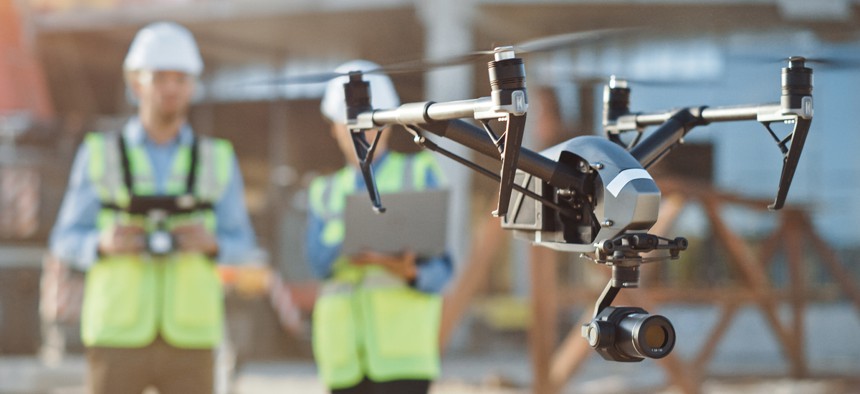FAA Releases Remote ID, the Largest Regulatory Change for Drones In Years

Gorodenkoff/Shutterstock.com
Part of the purpose is to allow for more complex operations in the future.
The Federal Aviation Administration recently released its Remote ID ruling for drones, which will require drones to broadcast their location as they fly. The purpose behind the new regulation is to make the airspace safer and allow for more complex operations in the future.
When the FAA first proposed Remote ID in 2019, there was considerable criticism from the drone community. In its initial proposal, the FAA required drones to maintain an internet connection, which not only made expensive monthly fees inevitable but would’ve also prevented drones from flying in remote locations without access to cellphone towers.
Over 50,000 people responded back to the FAA with comments. The FAA spent more than a year taking the feedback into consideration and the final Remote ID regulation has received positive feedback from the community. So what are the new rules?
A License Plate for Drones
The FAA has long wanted to equip drones with a digital license plate. The idea is that government agencies, law enforcement and the general public should be able to track drones that are flying overhead. This is not much different than the current tracking system put in place for manned aircraft.
In its original proposal in late 2019, the FAA proposed a complex system that would both broadcast a signal for short-range identification as well as a network connection to send the information to the cloud. Facing major pushback from the general public, the FAA reverted to a simpler solution that only requires broadcasting the "license plate" information within a short distance of the aircraft.
What information will be available and to whom?
The drone will broadcast its serial number during flight. It will also include information on the location of the drone, its altitude, speed, and direction of flight. In addition, either the takeoff location or the controller’s location will also be made available as part of what the FAA calls the "message." Most likely, either Wi-Fi or Bluetooth will be used to broadcast the signal.
People on the ground who are equipped with a smartphone will be able to use an app to receive the message and find information about the aircraft and the pilot. The FAA, law enforcement and other federal agencies will also have the ability to cross-reference the license plate number and access the pilot’s personal information. The general public won’t be able to do that.
Most existing drones can likely receive a firmware update and be able to broadcast the signal without additional cost. Older noncompliant drones can attach a module to their drone that will broadcast the signal.
Remote ID will come into effect in stages. Drone manufacturers will need to fully comply with Remote ID by September 2022. All drones sold after this point must be Remote ID-compliant ahead of the September 2023 compliance date for drone pilots.
Not a Perfect Solution
Although Remote ID is a step forward, there are some areas of concern. First and foremost, some have argued that broadcasting the location of the drone pilot could lead to harassment. It’s against federal law to interfere with the operation of an aircraft, but confrontations have happened before. However, the FAA will not release the name of the person flying to the public, but the GPS coordinates of the drone pilot can still be picked up by people close enough to receive the Remote ID broadcast signal.
One final issue is that drones may have a difficult time flying indoors, especially if they can’t establish a GPS signal. This is because the FAA requires drone manufacturers to not allow people to turn the signal off. The FAA is open to ideas on how to solve this issue and it’s likely that a solution will appear before the rules come fully into effect in 2023.
Flying Over People and Vehicles
The new regulation will also grant additional privileges to people who fly their drones with a Part 107 license. Nonrecreational flyers will be able to fly at night in controlled airspace and fly over people and vehicles under certain conditions.
The FAA will categorize drones. Category 1 is for drones that weigh less than 250 grams. As long as these drones have prop guards or software to stop the blades from rotating upon impact, then these drones qualify for the new privileges as soon as March of this year. The DJI Mini 2 is one such drone, although adding prop guards might increase the weight to more than 250 grams. People are exploring using lighter batteries to meet the requirements.
Operations with drones that weigh more than 250 grams will be categorized as Category 2 and 3. These drones can’t be used to fly over people or vehicles until manufacturers submit additional documentation to the FAA and it’s approved. This will take some time, but it’s possible it could happen before the end of 2021.
Overall, the FAA has done a great job integrating feedback from the drone community in the final Remote ID rulemaking. People were rightly concerned about the initial proposal, but the final Remote ID framework will allow for more complex drone operations going forward, including flying over people, vehicles, and potentially beyond visual line of sight.
Greg Reverdiau is the lead instructor and co-founder of Pilot Institute.
NEXT STORY: 4 Data Analytics Trends to Watch in 2021





